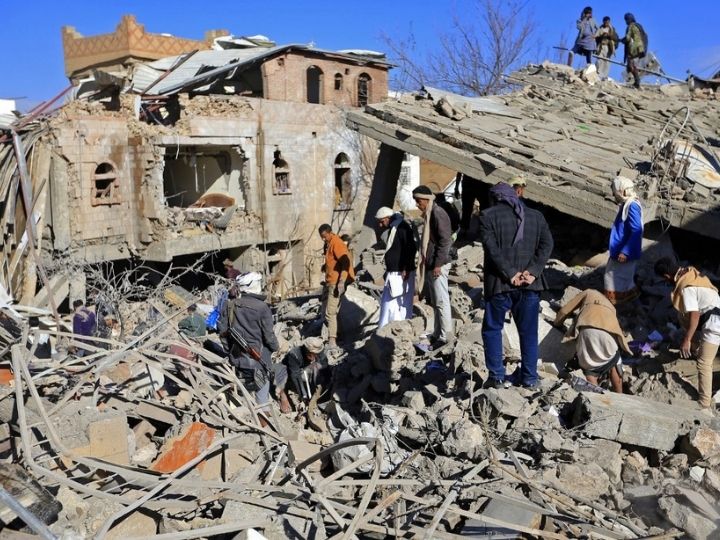EXPLAINED: Who Are Houthi Rebels? The Yemen Group Behind UAE Drone Attacks That Killed 2 Indians
The drone attacks by Houthi rebels set off explosions in fuel trucks and also caused a fire near the international airport in capital Abu Dhabi, killing three persons and injuring six.

New Delhi: Two Indian nationals and one person from Pakistan were killed in Monday’s terror attacks in the United Arab Emirates that also left at least six injured, including two Indians.
The attacks using missiles and drones set off explosions in fuel trucks and also caused a fire near the international airport in capital Abu Dhabi.
Yemen’s Iran-aligned Houthi rebels later claimed responsibility for the attacks. The Houthis’ military spokesman Yahya Sare’e tweeted that the group had launched a military operation “in the depth of UAE”.
The UAE is part of a Saudi Arabia-led coalition that has been involved in Yemen's ongoing civil war since 2015. In retaliation of Monday's drone attacks, the Saudis hit back with deadly airstrikes in Yemen, which left at least 20 people dead, according to reports.
Who Are Houthis?
The Houthi rebels are an insurgent group controlling most of the northern part of Yemen. They largely follow the Zaydi sect of Shi’a Islam.
The ‘Houthi movement’ is formally known as Ansar Allah (Partisans of God).
Zaydis, the Shi’ite minority group they are part of, make up around 35 per cent of the total population of Yemen, according to a Wilson Center article.
The Zaydis originate from a large clan in the northwestern Saada province of Yemen. Zayd was a great-grandson of Prophet Muhammad’s cousin and son-in-law Caliph Ali, the first Imam in Shi’a Islam.
While Shias are a minority among Muslims, Zaydis are considered a minority among the Shi’ites.
The sect emerged after Zayd rebelled against the Umayyad empire in the 8th century. They believe Zayd was a “pure Caliph” and the rightful Imam because he acted against an unjust rule.
Houthis In Yemen
Zaydis have been ruling Yemen for many generations now. A Zaydi monarchy has survived in northern Yemen for more than 1,000 years, according to recorded history.
But it was in the 1990s, during the rule of dictator Ali Abdullah Saleh, that the ongoing political movement started. While the group initially only wanted to defend their religious traditions, and were holding schools and summer camps as part of a revivalist movement, within a decade it was leading an insurgency against Saleh's military.
The group was “deeply radicalised” after the US invasion of Iraq in 2003, and it was then that they started calling themselves “Ansar Allah”, or supporters of God, according to a Brookings article.
Hezbollah, the Shi’ite group in Lebanon, became a mentor for the Zaydi rebels who fought the Saleh government from 2004 and 2010.
In 2004, insurgent leader Hussein al-Houthi and 20 of his aides were killed in Marran province after Saleh, taking support from the Saudis, launched a series of military campaigns in Saada province dominated by the Houthis.
After the Arab Spring in 2011, however, the group aligned with Saleh who was not a president any more.
In 2014-15, Houthi rebels overthrew Saleh’s successor Abdrabbuh Mansur Hadi’s government and captured capital Sana’a, with the help of the former president.
A 2015 UN Security Council report said the Houthi group had 75,000 armed fighters, with nearly 50,000 unarmed loyalists extending support to them.

Who The Houthis Are Now Fighting, And Why
Following Saleh’s fall, after the Arab Spring started in 2011, the Houthis had actively participated in the National Dialogue in support of a democratic state. They reportedly also demanded regional autonomy and respect for diversity.
But things didn't go as planned. At the helm of an interim government, President Abdrabbuh Mansour Hadi faced attacks by jihadists and struggling to deal with a separatist movement in southern Yemen, besides unemployment and food insecurity. On top of it, security personnel were still loyal to Saleh, according to reports.
When the Houthi rebels sided with Saleh and captured Sana’a, their stated aim, according to a BBC report, was to have a more effective government so the outcomes of the National Dialogue could be implemented.
But in the meantime, the group also sought military dominance in the north and had launched an aggressive campaign.
Soon, with Saleh as an ally, the Houthis became a dominant military and political force.
A Saudi Arabia-led coalition entered the scene in 2015, launching an intervention as the Houthi rebels after seizing Sana’a had allowed direct flights to and from Tehran and also given Iran an access to the port of Hodeidah.
The UAE was part of the coalition, along with seven other Gulf countries, mostly Sunni Arab states. The aim was to end the influence of Iran, a Shia-dominated country, in Yemen and restore Hadi's government.
While Saudi officials had forecast that the war would last only a few weeks, it is still on.
Since landing in the port city of Aden in August 2015, the coalition troops have managed to drive the Houthis and their allies out of much of the south. But Sanaa and much of the north-west are still under the rebels.
The Houthis’ alliance with Saleh ended in 2017. He was killed fleeing Sana’a after he reportedly tried to switch sides.
By 2018, the coalition and its allies were joined by Saleh loyalists, and they launched an offensive to capture the Red Sea city of Hudaydah from the Houthis. The Hudaydah port is the main lifeline for Yemenis.
The warring parties agreed to a ceasefire after six months. But with terms of the agreement not fully met, there are fears the Hudaydah battle could resume, a November 2021 BBC report said.
For the last six years, President Hadi's government has been based in Aden, struggling to provide basic services to its people, with the president himself stationed in Saudi Arabia.
The UAE has now withdrawn most of its own troops from Yemen, but it still supports anti-Houthi forces in Yemen.
Days before, the UAE-backed militias in Yemen launched an offensive against Houthis in Marib province, a crucial oil and gas hub controlled by the government backed by the Saudi coalition. Most of Yemen’s worst fighting over the last year occurred in this province where the Houthis went on the offensive in 2021 to capture the government's last stronghold in the north.
Emirati-backed forces also claimed recently that they had taken control of the nearby province of Shabwa from Houthis.
In retaliation, the Houthi rebels captured a UAE-flagged cargo ship on January 3.
Quoting Muhammad al-Bukhaiti, a member of the Houthis’ political bureau, a report in The New York Times said the group had refrained from attacking the UAE in recent years because Emirati ground troops had left Yemen. But they decided to resume attacks after the Shabwa move, he said.
With global leaders rallying around the UAE since the drone attacks, the Saudi-led coalition said on Tuesday it had begun strikes at Houthi strongholds and camps in Sana’a. Airstrikes on the Yemeni capital killed nearly 20 people, media reports said, quoting Houthi forces.
Related Video
Breaking News: BJP’s New National President Pays Tribute to Party Workers and Leadership







































